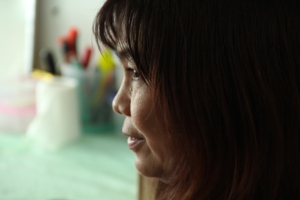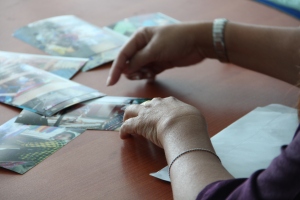Author Archives: chiaratp
From Malaria Prevention to Women Garment Workers, a polyhedral Social Business and Myanmar’s growing apparel industry.
Pictures by Elena Brunello. Text by Chiara Tommencioni Pisapia
During a recent trip to Myanmar I paid a visit to Business Kind Myanmar (BKM), about which I had first read in an online article profiling women workers in the country’s garment industry. As I arrived in Yangon, I went to meet Tandar Ko, the director of BKM, who kindly received my two friends and me in BKM’s office based in the Mayangon District. Tandar Ko, with her radiant personality, told us the story of BKM and how it works.  BKM is a non-profit NGO that establishes social business in order to help wider civil society. It employs women from rural areas that are affected by diseases such as HIV-AIDS and malaria. BKM was founded by Dr. Helen Gunthorpe and it operates at different levels. It focuses on the fair trade of crucial products related to malaria and dengue prevention such as bed nets, citronella candles, insecticide-treated bed nets, alongside educational programs concerning health prevention and the tutelage of those considered to be vulnerable employees.
BKM is a non-profit NGO that establishes social business in order to help wider civil society. It employs women from rural areas that are affected by diseases such as HIV-AIDS and malaria. BKM was founded by Dr. Helen Gunthorpe and it operates at different levels. It focuses on the fair trade of crucial products related to malaria and dengue prevention such as bed nets, citronella candles, insecticide-treated bed nets, alongside educational programs concerning health prevention and the tutelage of those considered to be vulnerable employees. In addition, BKM created the first Women Garment Workers association in Myanmar. Thon Pan Hla, the official name chosen for this association, provides support and accommodation for those women who are not Yangon natives. At Swiss House, the house that belongs to BKM and is located in the heart of one of Yangon’s industrial zones, patrons have access to washing machine services, use of the kitchen and common areas, a library and a Sunday Cafè where meetings are held in addition to training and support.
In addition, BKM created the first Women Garment Workers association in Myanmar. Thon Pan Hla, the official name chosen for this association, provides support and accommodation for those women who are not Yangon natives. At Swiss House, the house that belongs to BKM and is located in the heart of one of Yangon’s industrial zones, patrons have access to washing machine services, use of the kitchen and common areas, a library and a Sunday Cafè where meetings are held in addition to training and support.  Women represent 99% of BKM’s workforce, leaving just one man, Mr. Aung Kyaw Oo, as head of Logistics and the Sales Department. Good Sleep is a BKM project that involves the production and distribution of bed nets. The program teaches vulnerable women how to sew in order to produce bed nets that are vital for malaria and dengue prevention. Their factory is based in Hlaing Tharyar Township in Yangon, and boasts a workforce of fifteen people. Two of them are tasked with nets cutting, while three others are in charge of quality control, a total of nine machines in use altogether. BKM offers six types of bed nets to the public, which come in different sizes and fabric: cotton or synthetic, single, double and family size nets. Sewing a bed net is about three hours’ work, and the factory produces about fifty two nets per day that are eventually distributed from normal City Marts, a popular supermarket chain in Myanmar, to the most remote regions of Myanmar. Insecticide-treated bed nets are usually distributed for free in rural villages that are afflicted by acute political and economic crisis. Women employed in the BKM factory work eight hours a days from 8.30 am to 5.30 pm Monday to Friday plus two Saturdays per month. For those women employees affected by disease, BKM offers special assistance; e.g. if, for any reason somebody needs to stay home, workers can take as much time off as needed and return to the factory safe in the knowledge that the job awaits them. While home, they are temporarily replaced by other women not affected by disease.
Women represent 99% of BKM’s workforce, leaving just one man, Mr. Aung Kyaw Oo, as head of Logistics and the Sales Department. Good Sleep is a BKM project that involves the production and distribution of bed nets. The program teaches vulnerable women how to sew in order to produce bed nets that are vital for malaria and dengue prevention. Their factory is based in Hlaing Tharyar Township in Yangon, and boasts a workforce of fifteen people. Two of them are tasked with nets cutting, while three others are in charge of quality control, a total of nine machines in use altogether. BKM offers six types of bed nets to the public, which come in different sizes and fabric: cotton or synthetic, single, double and family size nets. Sewing a bed net is about three hours’ work, and the factory produces about fifty two nets per day that are eventually distributed from normal City Marts, a popular supermarket chain in Myanmar, to the most remote regions of Myanmar. Insecticide-treated bed nets are usually distributed for free in rural villages that are afflicted by acute political and economic crisis. Women employed in the BKM factory work eight hours a days from 8.30 am to 5.30 pm Monday to Friday plus two Saturdays per month. For those women employees affected by disease, BKM offers special assistance; e.g. if, for any reason somebody needs to stay home, workers can take as much time off as needed and return to the factory safe in the knowledge that the job awaits them. While home, they are temporarily replaced by other women not affected by disease.  Thandar Ko revealed to us her passion for fashion and creating garments. Having noticed her beautiful clothes, we were impressed to hear that she had made them herself. Moreover,BKM is now thinking of expanding its fair trade to cloths. She brought us in the mezzanine where wonderful textiles hung near a board showing her sketches and ideas of western women’s clothing. However, she confessed that she is encountering a few problems: for instance often the fabric is not big enough to cut a dress for a western size. To resolve this, they are trying to negotiate with the owner of the workshop where the fabric is weaved to make it wider.
Thandar Ko revealed to us her passion for fashion and creating garments. Having noticed her beautiful clothes, we were impressed to hear that she had made them herself. Moreover,BKM is now thinking of expanding its fair trade to cloths. She brought us in the mezzanine where wonderful textiles hung near a board showing her sketches and ideas of western women’s clothing. However, she confessed that she is encountering a few problems: for instance often the fabric is not big enough to cut a dress for a western size. To resolve this, they are trying to negotiate with the owner of the workshop where the fabric is weaved to make it wider.  The fabrics are already rich and beautiful and do not need complicated silhouettes. ‘Cutting and sewing a pattern is more difficult then cutting and sewing a bed net, which is just done by straight lines’ , says Thandar Ko, who stresses the need to keep this in mind. In order to start the production, they will need to train their employees for the task.
The fabrics are already rich and beautiful and do not need complicated silhouettes. ‘Cutting and sewing a pattern is more difficult then cutting and sewing a bed net, which is just done by straight lines’ , says Thandar Ko, who stresses the need to keep this in mind. In order to start the production, they will need to train their employees for the task.  Since the Burmese military dictatorship formally came to an end in 2011, and western countries started to open up to the Myanmar economy, labour-related issues in Myamnar’s Garment Industry have become serious. Since then, garment manufacture has leaped remarkably, and today 90% of the employees in this sector are women.
Since the Burmese military dictatorship formally came to an end in 2011, and western countries started to open up to the Myanmar economy, labour-related issues in Myamnar’s Garment Industry have become serious. Since then, garment manufacture has leaped remarkably, and today 90% of the employees in this sector are women.  It is no coincidence that the garment industry is becoming so important, in fact in Myanmar they have an extremely strong tradition of weavers, who make beautiful fabrics in extremely colorful patterns. The problems of regulation, training and awareness are issues that are slowly becoming crucial and widespread. Foreseeing the potential of manufacturing in Myanmar, the European Union created SMART; a project that promotes and supports the sustainable production of garments. South Korea and Japan are the foremost countries that are producing in Myanmar, but western big companies, such as Gap and Adidas are sourcing there as well. Garment workers earn between 75 dollars and 150 dollars a month, and often employees are under aged. Protests spread recently in Yangon from workers of five different companies. Last February the first Code of Conduct for Myanmar’s apparel industry was ratified, the result of a collaboration between the Myanmar Garment Manufacturers Association and the European Union’s SMART Myanmar project Today, with the opening of western economies towards Myanmar and the growing importance of social issues generated by the formal end of a military dictatorship that has lasted more than forty years, Myanmar’s labour-related issues are becoming an urgent problem, but this could also offer an opportunity for Myanmar to become a model country for sustainable garment production. For more information about Business Kind Myanmar, please visit http://www.businesskind.org For more information about SMART Myanmar, please visit http://www.smartmyanmar.org For more information about Responsible Sourcing in Myanmar, http://www.bsr.org/files/BSR_Principles_of_Responsible_Sourcing_in_Myanmar_Garment_Sector.pdf For more information an updated news about garment production in Myanmar https://www.sourcingjournalonline.com For more information about NGO in Myanmar https://ngo.mycitizen.net
It is no coincidence that the garment industry is becoming so important, in fact in Myanmar they have an extremely strong tradition of weavers, who make beautiful fabrics in extremely colorful patterns. The problems of regulation, training and awareness are issues that are slowly becoming crucial and widespread. Foreseeing the potential of manufacturing in Myanmar, the European Union created SMART; a project that promotes and supports the sustainable production of garments. South Korea and Japan are the foremost countries that are producing in Myanmar, but western big companies, such as Gap and Adidas are sourcing there as well. Garment workers earn between 75 dollars and 150 dollars a month, and often employees are under aged. Protests spread recently in Yangon from workers of five different companies. Last February the first Code of Conduct for Myanmar’s apparel industry was ratified, the result of a collaboration between the Myanmar Garment Manufacturers Association and the European Union’s SMART Myanmar project Today, with the opening of western economies towards Myanmar and the growing importance of social issues generated by the formal end of a military dictatorship that has lasted more than forty years, Myanmar’s labour-related issues are becoming an urgent problem, but this could also offer an opportunity for Myanmar to become a model country for sustainable garment production. For more information about Business Kind Myanmar, please visit http://www.businesskind.org For more information about SMART Myanmar, please visit http://www.smartmyanmar.org For more information about Responsible Sourcing in Myanmar, http://www.bsr.org/files/BSR_Principles_of_Responsible_Sourcing_in_Myanmar_Garment_Sector.pdf For more information an updated news about garment production in Myanmar https://www.sourcingjournalonline.com For more information about NGO in Myanmar https://ngo.mycitizen.net